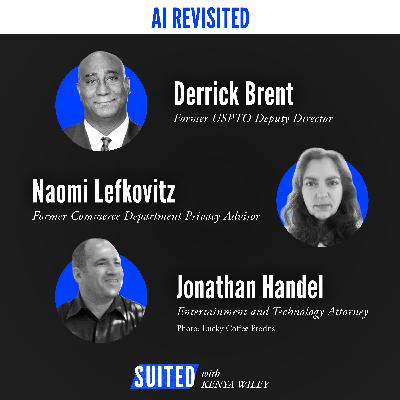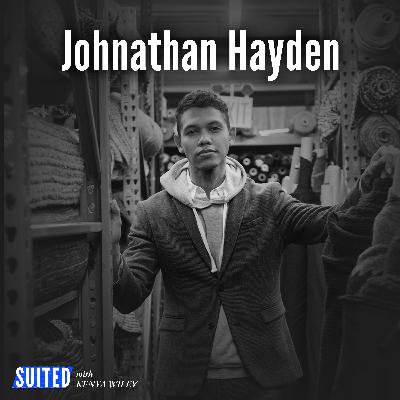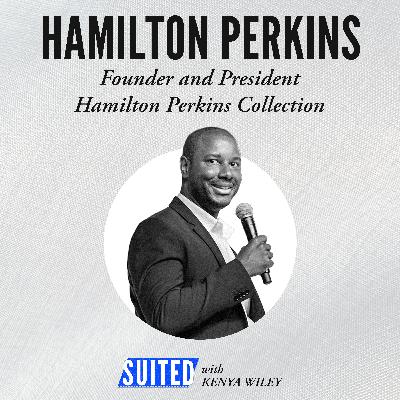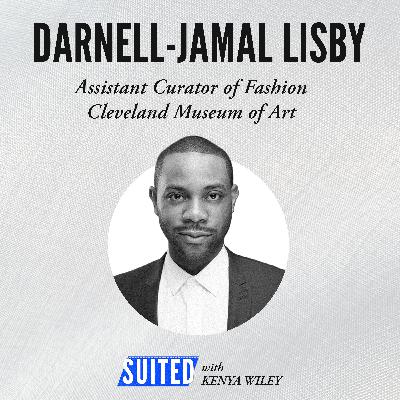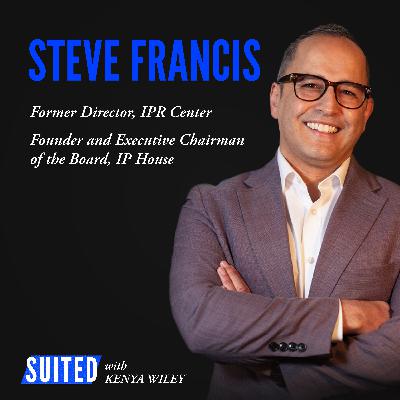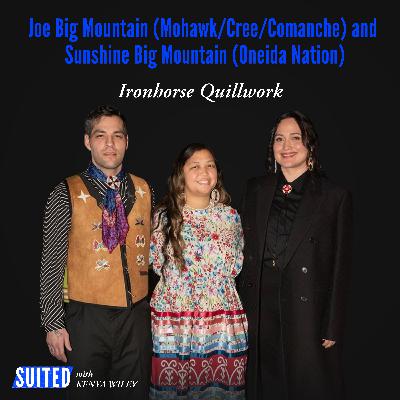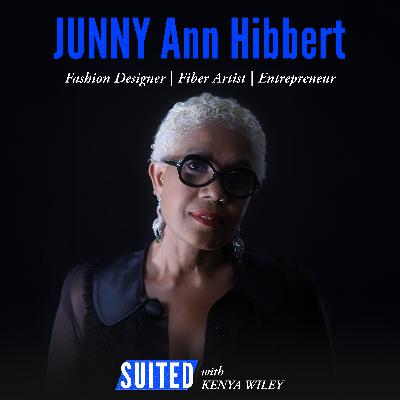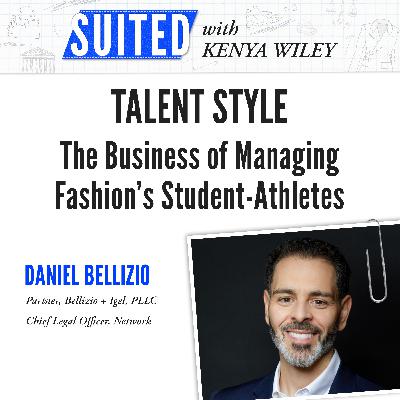Discover Suited with Kenya Wiley
Suited with Kenya Wiley

Suited with Kenya Wiley
Author: Kenya Wiley
Subscribed: 0Played: 0Subscribe
Share
© 2025
Description
Fashion is not just the clothes and shoes that we wear. It’s a vast framework that touches every aspect of our existence and everyone around the world – from production to our pocketbooks. Kenya Wiley, former Senate staffer turned fashion law professor and policy counsel, takes us into how this trillion-dollar industry impacts our daily lives – in the face of AI, climate change, and now, a new Congress and president. Join us as we deep dive into the fashion industry, discuss hot legal and policy topics, and help forge new pathways for the next generation of creatives. Whether you’re a design or fashion law student, industry professional, or content creator, the Suited pod has you covered.
23 Episodes
Reverse
Interested in breaking into fashion law? And for designers showing at New York Fashion Week, how will you protect your brand?Howard Hogan, a partner at Gibson Dunn and chair of his firm's Consumer and Retail practice group, joins us to discuss the third edition of Fashion Law and Business: Brands and Retailers. We'll dive into the key updates in Howard’s fashion law book — from IP developments around AI to his new chapter on environmental law and sustainability.Howard also breaks down how brands can minimize their risk when showing at New York Fashion Week this month — especially when it comes to IP protection and partnerships with celebrities and content creators. Plus, Howard shares his four-part strategy for law students and new associates looking to break into fashion law.Purchase Fashion Law and Business: Brands and Retailers (Third Edition), 20% discount code for e-book and print book Connect with Howard HoganFor more on fashion law, politics and policy, follow SUITED on Instagram and subscribe to our newsletter here.
What does synthetic biology have to do with the fashion industry? How is AI connected to energy, government policy and the cost of goods?In this episode, applied innovation expert Barry McGeough shares his solution for fashion to deal with its current challenges: Get out of our bubble!Barry has led applied innovation for the biggest names in fashion and tech — including The North Face, PVH, parent company for Calvin Klein and Tommy Hilfiger, and Google.Barry shares so many gems with our listeners, including how material informatics is connected to AI in fashion, why ethical AI is essential, and how startups will drive the industry forward during these transformative times.Connect with Barry McGeough on LinkedIn.Read Barry’s article for The Robin Report on Warnings and Revelations About AI.For more on fashion law, politics and policy, follow SUITED on Instagram and subscribe to our newsletter here.
Step into the dynamic intersection of fashion, technology, and entertainment with LA-based IP Attorney Almuhtada Smith. Our conversation comes at a crucial time as AI innovation reshapes creative industries and Los Angeles prepares for the 2028 Olympics.After working in Big Law for several years, Almuhtada started his own firm, ARS Counsel — Strategic Counsel for Innovators and Creatives. He's represented trailblazers in fashion and tech, including a recent collaboration with his client Cointel and legendary filmmaker Spike Lee. Almuhtada graduated magna cum laude, Phi Beta Kappa from Morehouse College and received his J.D. from UCLA School of Law, where he served as chief managing editor of the Entertainment Law Review.In this episode, Almuhtada takes us behind the scenes of the collab between Cointel and Spike Lee. He also breaks down IP issues beyond registration that fashion and tech entrepreneurs should be thinking about when participating in accelerator programs, and why founders need independent legal representation — even when programs provide attorneys. And as the tech policy landscape continues to evolve, Almuhtada explains how AI is revolutionizing entertainment and retail, and makes the case for legislation that ensures ethical AI use while allowing for small businesses to compete in the space.Plus, Almuhtada shares his insights on how third-year law students and recent graduates can secure a position in fashion law and entertainment in the current legal market.This episode is a must-listen for designers, tech startups and law school students — especially in the current legal market.Connect with Almuhtada on LinkedIn and InstagramLearn more about ARS Counsel: website, LinkedIn and InstagramRead Almuhtada’s Bloomberg Law piece on IP reparations for Black artists.For more on fashion law, politics and policy, follow SUITED on Instagram and subscribe to our newsletter here.
OpenAI recently launched GPT-5 — the latest model for the company's AI chatbot ChatGPT, even as debate continues over whether the update delivers on promises of PhD-level capabilities. This development underscores the critical importance of understanding how generative AI is transforming industries worldwide, including fashion.In this remix episode, we explore how artificial intelligence is reshaping fashion law through a curated selection of our most insightful conversations. We examine the legal and policy challenges emerging from generative AI tools used in fashion design, marketing, and merchandising.The episode features three key discussions: first, insights from Derrick Brent, former Deputy Director of the U.S. Patent and Trademark Office; followed by perspectives from Naomi Lefkovitz, former privacy policy advisor at the Commerce Department; and concluding with entertainment and technology attorney Jonathan Handel's analysis of the bipartisan AI Accountability and Personal Data Protection Act, introduced by Senators Josh Hawley and Richard Blumenthal in July 2025.For more on fashion law, politics and policy, follow SUITED on Instagram and subscribe to our newsletter here.
For months now, a critical question has been playing out in the courts, the Copyright Office and Congress: When tech companies use large amounts of copyrighted works to train their AI models without permission or payment to the copyright holders, is that fair use or illegal infringement?And why should fashion — an industry that has traditionally relied more on trademark law than copyright protection — care about the latest copyright debate?In this episode, entertainment and technology attorney Jonathan Handel examines why the AI copyright battle matters to fashion and entertainment creatives, covering legal and policy developments across all three branches of the federal government — including the bipartisan AI Accountability and Personal Data Protection Act by Senators Josh Hawley and Richard Blumenthal. Fashion brands and retailers are already using AI for design and marketing campaigns — while their own content gets swept up in AI training data. Jonathan explains why the fashion industry should be concerned about the AI copyright debate, and shares his solution for bringing all stakeholders together.Connect with Jonathan Handel on LinkedIn and InstagramVisit Jonathan’s website hereSubscribe to Jonathan’s newsletterPurchase Jonathan’s bookFor more on fashion law, politics and policy, follow SUITED on Instagram and subscribe to our newsletter here.
In 1987, New York City created the Special Garment Center District to keep designers and manufacturers together in the heart of Manhattan. Now, nearly four decades later, the same city commission that created this protection is trying to tear it down. On June 18th, the New York City Planning Commission voted to eliminate the special zoning and open the door to residential development in what remains the heart of New York's fashion capital.Today, we're joined by Johnathan Hayden — a womenswear designer based in the Garment District — to share his story and discuss how the Midtown South Mixed-Use (MSMX) plan would impact his career and New York's entire fashion ecosystem. Proximity is fashion power. As Johnathan explains, “the Garment District is the only place in America where the distance between an idea and its execution is within walking distance.”Is the MSMX plan really about affordable housing, or does it benefit luxury developers while leaving fashion as collateral damage alongside the arts, Lincoln Center and Broadway?As the plan moves closer to a City Council vote, Johnathan shares concrete ways to save and support the Garment District in the days ahead. All links and resources are below.Sign the petition to protect NYC's Garment District! Visit the New York Fashion Workforce Development Coalition's site for more on the MSMX plan and fashion. Connect with Johnathan Hayden on Instagram and LinkedIn.For more on fashion law, politics and policy, follow SUITED on Instagram and subscribe to our newsletter here.
We're continuing our conversation with Elmar Stroomer, Founder of Africa Collect Textiles and Sarah Njau, Managing Director of GFS East Africa. In this episode, Sarah and Elmar dive deeper into practical solutions for both textile waste and the overall environmental impact of producing apparel in Kenya for American brands. We also discuss the African Growth and Opportunity Act (AGOA) — a trade preference program with the U.S. and certain African countries — and examine how U.S.-based startups in textile-to-textile recycling can help tackle both post-production and post-consumer textile waste.We address critical questions for U.S.-based fashion brands and startups: How can American brands producing in Kenya collaborate to handle their post-production waste more sustainably? Why should textile-to-textile recycling startups expand their operations to Kenya, and how can they do it effectively?Connect with Sarah Njau on LinkedInConnect with Elmar Stroomer on LinkedInAfrica Collect Textiles WebsiteSubscribe to the Suited newsletterConnect with Kenya: LinkedIn and InstagramFollow Suited with Kenya Wiley
The fashion industry faces major changes following President Trump's signing of the One Big Beautiful Bill Act on July 4th, just one day after Congress passed the sweeping budget and tax legislation. In this episode, Suited host Kenya Wiley — former Counsel and Senior Policy Advisor to the Senate Homeland Security and Governmental Affairs Committee — examines how this new law will impact the business of fashion across three critical areas: trade policy and sourcing, climate and environmental law, and higher education for fashion design and law students. The legislation creates ripple effects throughout fashion’s supply chain, affecting everyone from independent designers and major brands and retailers, to ecommerce companies, apparel manufacturers, shippers, and the farmers who provide raw materials. Kenya breaks down these complex policy changes into actionable insights for industry professionals navigating this new landscape.The episode concludes with powerful remarks from Democratic Leader Hakeem Jeffries, who delivered the longest floor speech in House history in efforts to delay the bill's passage. Subscribe to the Suited newsletter for more on the Big Beautiful Bill and other fashion law and policy updates Follow Suited with Kenya WileyConnect with Kenya: LinkedIn and Instagram
Extended Producer Responsibility (EPR) schemes for textiles are expanding worldwide — from France and the EU to Kenya, the Netherlands and California. But implementing EPR isn't just about government policy; it's also funding and infrastructure needed for textile collection, sorting, and recycling. In this episode of Suited, we explore how circular fashion must operate within a dual market. Take Kenya, for example — a country that Business Insider Africa reported in March 2025 is the largest importer of second-hand clothes in Africa. Here, textile waste streams from two different sources — local apparel manufacturing for both domestic consumption and export, and the secondhand clothing trade.Joining us are Sarah Njau, Managing Director of GFS East Africa, and Elmar Stroomer, Founder of Africa Collect Textiles. Together, we tackle critical questions: When does secondhand clothing become textile waste? What happens to fabric offcuts from factories in Kenya producing garments for global brands? And how do we go from EPR policy to building infrastructure in the regions most impacted by textile waste?Connect with Sarah Njau on LinkedInConnect with Elmar Stroomer on LinkedInAfrica Collect Textiles WebsiteConnect with Kenya: LinkedIn and InstagramFollow Suited with Kenya WileySubscribe to the Suited newsletter
While the World Bank's latest report projects a challenging economic outlook over the next two years, Hamilton Perkins represents a new generation of innovators charting a different course — fusing fashion, science and technology to create jobs and unlock capital connections. Hamilton is the winner of the 2023 Black Ambition Prize, presented by Pharrell Williams, and an alum of the Los Angeles Cleantech Incubator. He's currently working to commercialize intellectual property that converts waste streams into reusable materials, all while keeping law and policy top of mind — including the Responsible Textile Recovery Act, California's new Extended Producer Responsibility (EPR) law.In this episode, Hamilton shares his journey on launching the Hamilton Perkins Collection and how he’s working with California stakeholders as the state implements the nation’s first EPR law for textiles. Hamilton has built his sustainable fashion business with partners in fashion, tech, private capital, academia and government. Whether you're a fashion entrepreneur, startup founder, or anyone interested in circular business models, this conversation provides actionable strategies for launching ventures that generate both revenue and positive impact. Connect with Hamilton PerkinsHamilton Perkins WebsiteInstagram: @hamiltonperkinsLinkedIn: https://www.linkedin.com/in/hamiltonperkins/Facebook: @hamiltonperkinsX (Formerly Twitter): @hamiltonperkinsConnect with Kenya: LinkedIn and InstagramFollow Suited with Kenya WileySubscribe to the Suited newsletter
In this episode, we sit down with Sarika Bajaj, Co-Founder and CEO of Refiberd, whose groundbreaking technology combines AI and hyperspectral imaging to identify the material composition in textiles for recycling and resale. As the winner of eBay’s 2025 global Circular Fashion Fund, Sarika and her Co-Founder Tushita Gupta are pioneering a new frontier —offering crucial solutions as fashion brands navigate Extended Producer Responsibility (EPR) laws.Refiberd is tackling one of the fashion industry's greatest sustainability challenges. Industry reports show a staggering 92 million tons of textile waste generated annually, with most ending up in landfills or incinerators. Now, with their recent investment from eBay Ventures, Sarika and Tushita are expanding their technology to new partners and markets in recycling, resale and manufacturing.Our conversation explores their remarkable journey of launching in 2020 during the pandemic, raising capital in a difficult market, and moving forward as government policies continue to change — from unpredictable tariffs to EPR laws in jurisdictions around the world. We also discuss how Refiberd's AI and imaging technology has powerful applications for counterfeit detection.Sarika shares invaluable insights for fashion tech entrepreneurs. How do you know when to pivot your business model or if you should just stay the course and continue building on your original vision? Listen to the end for Sarika’s startup tips.Connect with Sarika BajajFollow Refiberd: LinkedIn and SiteConnect with Kenya: LinkedIn and InstagramFollow Suited with Kenya WileySubscribe to the Suited newsletter
Join us for an insightful conversation with Victoria Watkins. As an OG fashion law attorney and blogger, Victoria established one of the first platforms dedicated to fashion law, business, and entertainment over a decade ago. Now, as Founder and Managing Partner of Inrichmint, Victoria sources and manages curated deal flow — connecting investors with creative entrepreneurs looking to scale and build their brands. In this episode, Victoria shares why intellectual property is a great value booster and essential to a company’s valuation, and why social media metrics do not always translate to revenue. We also discussed the impact of tariffs on dealmaking, and as Victoria noted, “Everybody should be paying attention to tariffs now because we are all being affected in some way or another.”We also reflect on fashion law's evolution and explore what success in this field requires today. Recorded just days before the Met Gala and the “Superfine” exhibition at the Metropolitan Museum's Costume Institute, our conversation naturally turns to Black dandyism and athletes as today’s stars on fashion’s red carpet. Connect with Victoria Watkins LinkedInInstagram Inrichmint Website Connect with Kenya: LinkedIn and InstagramFollow Suited with Kenya WileySubscribe to the Suited newsletter
Step into the fascinating world where fashion meets politics as we welcome Jonathan Michael Square for an illuminating conversation on fashion, politics and Black dandyism. Our timely discussion arrives just before the 2025 Met Gala and the Costume Institute's exhibition, "Superfine: Tailoring Black Style."Dr. Square is the Assistant Professor of Black Visual Culture at Parsons School of Design. He has a PhD in history from New York University, an MA from the University of Texas at Austin, and a BA from Cornell University. Dr. Square was a fellow in the Costume Institute at the Metropolitan Museum of Art and he’s also a member of the advisory committee for the Costume Institute’s “Superfine” exhibition.Jonathan explores how politics is woven into the fabric of Black dandyism and its intertwined relationship with respectability. He offers insights from his current NYU course on Black dandyism and, as a member of the "Superfine" advisory committee, provides a sneak peek of the upcoming exhibition. Our conversation briefly shifts to examine dress codes in the corridors of power — from Capitol Hill (catch our fashion footnote in the episode) to the White House. Jonathan also shares strategies for scholars and students focused on the intersection of fashion, race, politics and culture — during a time when certain terms and academic fields face increasing scrutiny. Special guest, octogenarian Robert William Wiley, also joined us at the end to share how he and his uncles have embodied Black dandyism over the years.Connect with Dr. Jonathan Michael Square: Instagram and WebsiteConnect with Kenya: LinkedIn and InstagramFollow Suited with Kenya WileySubscribe to the Suited newsletter
Join us as we sit down with Darnell-Jamal Lisby, the first fashion curator at the Cleveland Museum of Art (CMA), just days before the 2025 Met Gala and the opening of "Superfine: Tailoring Black Style" at the Costume Institute.As a fashion historian, Lisby helped organize CMA’s iteration of "The New Black Vanguard: Photography between Art and Fashion" and curated the exhibitions "Egyptomania: Fashion’s Conflicted Obsession" and "Korean Couture: Generations of Revolution." Prior to joining CMA, Lisby worked at Cooper Hewitt, Smithsonian Design Museum, where he organized programming for the museum’s first virtual — and best attended — symposium, “Fashion, Culture, Futures: African American Ingenuity, Activism, and Storytelling.” Lisby holds degrees from the Fashion Institute of Technology, including an MA in fashion and textiles studies: history, theory, and museum practice and a BS in art history and museum professions.This year’s exhibition, guest-curated by Monica L. Miller and inspired by her seminal work "Slaves to Fashion: Black Dandyism and the Styling of Black Diasporic Identity,” explores the history of Black dandyism and the intersection of fashion, power and identity.Our fascinating conversation with Darnell-Jamal delves into fashion as a political statement, the evolution of Black dandyism throughout history, and the boundary between cultural appreciation and appropriation as Black style and culture is celebrated and promoted as part of the “Superfine” exhibition.Connect with Darnell-Jamal Lisby: Instagram and LinkedInDr. Jonathan Michael Square: Instagram and WebsiteProfessor Susan Scafidi, Founder and Academic Director, Fashion Law Institute and author, Who Owns Culture: Appropriation and Authenticity in American LawKimberly Jenkins, The Fashion and Race DatabaseConnect with Kenya: LinkedIn and InstagramFollow Suited on Instagram and LinkedInSubscribe to the Suited newsletter
In this episode, we’re excited to welcome Steve Francis. Steve is the former Director of the National Intellectual Property Rights Coordination Center (IPR Center) and he is currently the Founder and Executive Chairman of the Board at IP House. Drawing on his extensive experience connecting intellectual property and trade, Steve offers expert insights on the tariff turmoil, an end to the de minimis exemption for China and Hong Kong, and the potential impact on counterfeit goods entering the United States.According to U.S. Customs and Border Protection’s 2024 IPR seizure statistics, fashion items — including handbags, jewelry, apparel and footwear — remain the top commodities seized. We discuss how fashion, cyber and counterfeiting crimes are intertwined — taking us back to the early days of fashion tech. Steve shares how a lot of these crimes are cyber-enabled, from e-commerce and phishing scams to the growing influence of dupes and social media personalities.Regarding tariffs and de minimis changes, Steve notes that while costs will increase, "the bad actors are still gonna continue to find a way to circumvent the tariffs.”Our conversation also covers the U.S.-China trade tensions and TikTok, including viral videos claiming to offer "inside looks" at Chinese manufacturers producing luxury goods. We also delve into the growing counterfeit market for weight loss and type 2 diabetes drugs, particularly GLP-1s. These medications are reshaping fashion and retail by altering the size curve and inventory. However, the GLP-1 boom comes with significant risks to consumers through the counterfeit market. Steve shares how when there’s a global demand for a particular product and consumers go outside that secure supply chain, it creates an opportunity for bad actors to take advantage of the situation. He also explains how his investigative team collaborates closely with law enforcement when combating counterfeits.In these unprecedented times, how can brands and retailers navigate trade wars while counterfeits continue to rise? Join us as we unpack these issues.Connect with Steve Francis on LinkedInLearn more about IP House: Website and LinkedInBrand Protection Guide for Small and Medium Sized BusinessesConnect with Kenya: LinkedIn and InstagramFollow Suited with Kenya WileySubscribe to the Suited newsletter
In this episode, we're excited to welcome Joe Big Mountain (Mohawk/Cree/Comanche) and Sunshine Big Mountain (Oneida Nation) of Ironhorse Quillwork. Joe Big Mountain is known for his one-of-a-kind quillwork, and in 2024, the Big Mountains co-created with Gucci two custom gowns worn by actor Lily Gladstone (Siksikaitsitapi [Blackfeet]/Nimiipuu [Nez Perce]) at the 96th Academy Awards and Vanity Fair Oscars party. The gowns featured porcupine quillwork done exclusively by the Big Mountains and their team of Native artists.The Big Mountains had a total of three weeks to design in Italy, teach Indigenous artists back home, and have the final gown ready for Lily at the Oscars. Joe and Sunshine made sure to keep the practice of quillwork — one of Indigenous Peoples’ oldest art forms in the northern region of North America — in Indigenous hands while also intertwining its cultural significance and meanings in the design process with Gucci. As Joe and Sunshine shared on this episode, Jason Rembert — the celebrity stylist who worked with Lily Gladstone — was also instrumental in ensuring that boundaries were held and that there was respect for quillwork as an art form throughout the collaboration process. Both gowns are currently at the National Museum of the American Indian in Washington, DC for a special installation through March 2026.Image: Joe and Sunshine Big Mountain with Lily Gladstone, Norwood PhotographyMaking a Statement at the National Museum of the American IndianConnect with Joe and Sunshine Big Mountain: Instagram and WebsiteConnect with Kenya: LinkedIn and InstagramFollow Suited with Kenya WileySubscribe to the Suited newsletter
In this special solo episode, Kenya discusses the tea on tariffs and other hot fashion policy issues in Washington — from threats to AGOA and attacks on higher education, to the FTC firings and what this means for fashion tech, labor and small, independent designers. Now is the time to stay connected and be prepared to use every legal tool in your fashion law toolbox. Connect with Kenya: LinkedIn and InstagramFollow Suited with Kenya Wiley Subscribe to the Suited newsletter
In this episode, we're excited to welcome Rebecca Henry and Akua Shabaka — the mother and daughter design duo behind House of Aama. Established in 2015 and manufactured in Los Angeles, House of Aama designs timeless pieces infused with heritage, history and storytelling. House of Aama is also the 2021 CFDA Vogue Fashion Fund Finalist.Rebecca serves as Director of Business and Legal Affairs and Akua is House of Aama’s Creative Director. It's not every day that an independent brand has in-house legal counsel from day one. Discover how having legal expertise early-on has shaped House of Aama’s journey and witness their real-time strategies for navigating today's economic and political uncertainties. And while currently manufacturing in Los Angeles, co-founders Rebecca and Akua share insights on how President Trump's sweeping tariffs could affect sourcing costs, especially for independent brands. As Rebecca noted on the podcast, “The fashion business is not U.S.-based. The fashion business is really based from international sources.”We also explored crucial labor questions: While garment worker protections receive attention, what about supporting fashion employers who create these jobs? How can state and local governments help to make it easier for brands and designers to manufacture locally? Tune in for this timely conversation at the intersection of fashion law, business and policy.Connect with House of Aama: Instagram and WebsiteConnect with Kenya: LinkedIn and InstagramFollow Suited with Kenya Wiley Subscribe to the Suited newsletter
New York designers are dealing with a lot right now — with the realities of the economy and current political landscape, including tariffs, increased costs for materials, and scarce funding opportunities — all while living in one of the most expensive cities in the world. In this episode, Kenya sits down with Harlem-based designer JUNNY Ann Hibbert to discuss how she built her fashion brand while also staying true to her creative voice. Discover how JUNNY integrated fashion law into her business from the very beginning and focused on doing good along the way. The conversation also delves into the role of government in supporting creative entrepreneurs — particularly at the local level in New York City. What do fashion designers need right now and how should government leaders help?JUNNY’s path into fashion was unconventional. After being downsized from her role as an ESPN sales executive, she channeled her energy into creativity, quickly gaining recognition for her unique designs. In 2021, she debuted her first collection at New York Fashion Week to critical acclaim, earning a spot as one of W Magazine’s top emerging talents of the year. JUNNY has received awards from the Council of Fashion Designers of America (CFDA), Fashion Group International (FGI) and Visa’s Next in Fashion. Her work has also been featured in Essence, The New York Times, The Wall Street Journal, WWD, and Vanity Fair. JUNNY’s creations — whether through fabric or fiber — tell powerful stories of pain, triumph, and cultural pride, making her a force in both fashion and art.Connect with JUNNY:LinkedIn: Junny Ann HibbertInstagram: @junny_nycWebsite: junny.nycConnect with Kenya: LinkedIn and InstagramFollow Suited with Kenya Wiley Subscribe to the Suited newsletter
Sports and fashion are more interconnected now than ever, and March Madness is showing just how powerful the two industries are together — particularly for student-athletes. In this episode, Kenya talks with fashion law attorney Daniel Bellizio about his storied career representing iconic designers in luxury and sportswear collaborations, and his current work in talent management at Network — advising student-athletes on cutting-edge deals in the evolving landscape of name, image and likeness (NIL).This conversation is a must-listen for designers, student-athletes and anyone interested in learning more about the merger of sports and fashion law. We discussed: intellectual property (IP) and other legal issues in collaborations and NIL deals; the business of talent management; what parents and student-athletes should know about branding and building a community; and whether it’s time for student-athletes and fashion designers to form unions to represent their respective interests.Connect with Daniel Bellizio: LinkedIn Follow Network: InstagramConnect with Kenya: LinkedIn and InstagramFollow Suited with Kenya Wiley Subscribe to the Suited newsletter
Comments
 United States
United States




